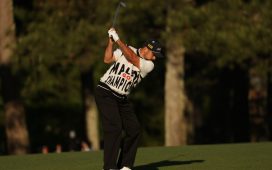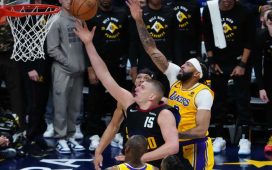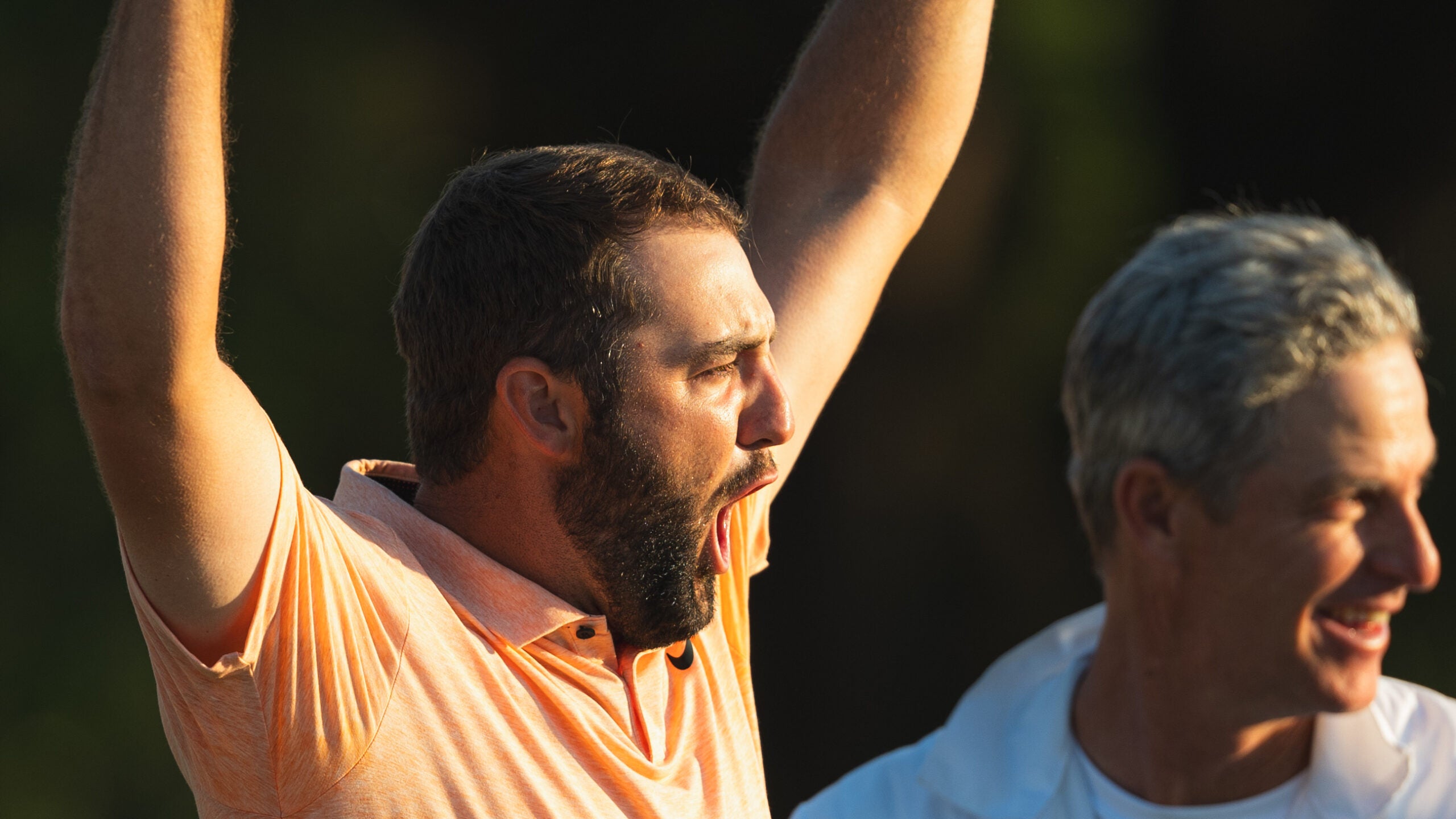
Scottie Scheffler’s second Masters victory has big implications for the sport.
Darren Riehl
AUGUSTA, Ga. — Six hours before Scottie Scheffler toppled the golf world again, a shockwave rippled through the Augusta National clubhouse.
The final party of Masters week — the one that takes place every year beneath the clubhouse’s enormous oak tree for the final few hours of Sunday before the serious work begins — had been interrupted. It was early yet, but not too early for a lightning bolt powerful enough to straighten the spines of every green coat from here to Atlanta. Its name was Tiger Woods, and after a long week, his Masters was over.
Tiger, you may have heard, is a Masters legend. One of maybe three mononymous figures in club history, the others being Arnie and Jack. And though he had thrashed and clawed against the great green tidal wave that is Augusta National over the previous four days, he had eventually succumbed. Woods finished 16 over and alone in 60th, last among players who made the weekend.
The end might be nearing for Tiger, who is 48 and hampered by years of injury. But Tiger is an Augusta National legend, and at a club that mythologizes its history and affluence and influence, becoming a legend is hard. In fact, in the 27 years since Woods announced arrival with a 12-shot Masters win, nobody has come close. Which meant that even now, after a difficult Masters finish, Tiger Woods was still powerful enough to halt Augusta National.
A hush fell over the clubhouse as he hustled off the 18th green. By the time he disappeared in a sweat-stained red shirt, he had earned the area’s undivided attention. The hush continued long after he was gone.
It will for the rest of his life.
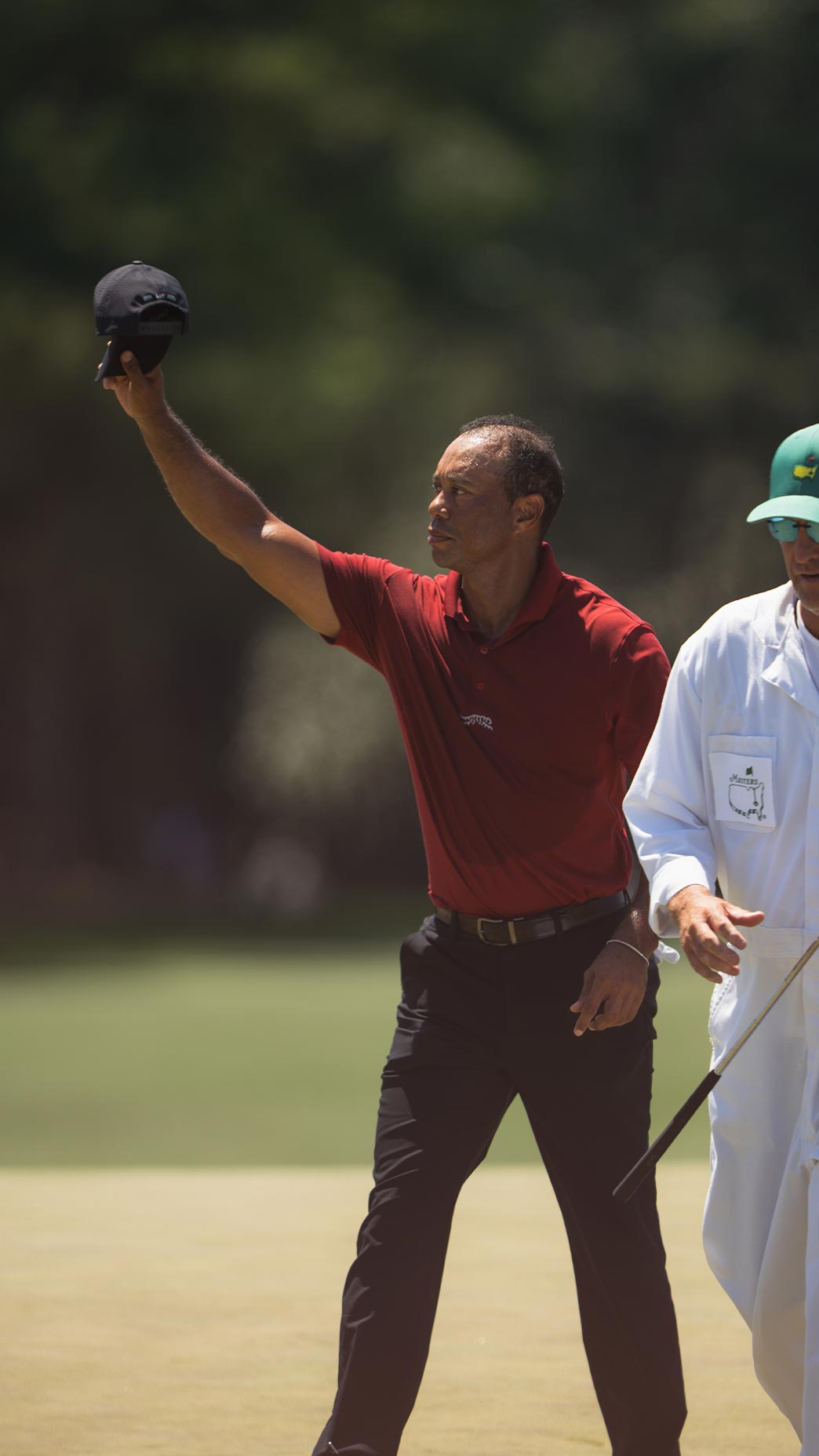
Darren Riehl
AN HOUR AFTER TIGER DISAPPEARED, a different energy rippled through Augusta National. It was time for the final pairings on the final day of the Masters, and time — perhaps even more significantly — to answer the question on the minds of everyone in the sport of golf come Sunday morning:
Had golf found another lightning bolt?
The truth that anyone with a pair of eyes could tell you heading into Augusta was that Scottie Scheffler was the best player in the world, period. Not the best player right now. Not the best over the last few weeks or months. But the best in a way so head-and-shoulders above his competitors that even the guys trying to beat him couldn’t ignore it.
On Thursday afternoon, when Bryson DeChambeau jumped out to an early Masters lead in the morning pairings, ESPN’s cameras caught him in a moment of very human disappointment. DeChambeau had sat down for his Butler Cabin interview seconds after Scheffler had sent his second shot on the par-5 13th tumbling into the abyss near Rae’s Creek. What’d Scottie make? DeChambeau had asked, assuming that the World No. 1’s ball had dropped into the water.
“Birdie,” ESPN host Scott Van Pelt replied.
DeChambeau, eyes widening, could not contain his surprise.
“Birdie?!” he said.
But even if Scottie had earned a reputation for being annoyingly good at golf, he hadn’t earned a reputation for being transcendent. That type of good belonged to the mononymous, the kind who could cause a leaderboard to wilt under the weight of their momentum and who could topple a great golf course with sheer force of will. The kind who could halt Augusta National.
That’s what Tiger would do. That’s what the Masters demands. And Scottie? Well, he didn’t seem to have that gear. He was too folksy to destroy his opponents, too friendly to have a killer instinct, too cordial to bend a sport to his will. His ball-striking was great but his putter was weak. He didn’t have it.
The truth is that golf has seen plenty of annoyingly good players over the years — players who could seize the World No. 1 ranking and hold it for months at a time — but it hasn’t seen a transcendent talent in much longer than that. The Masters is the perfect example of why. It is a test of a golfer’s mettle as much as it is one of his might. Winning here belongs not to the best hitters but to the best players, the ones who can avoid the dangerous spots and make the dangerous putts and execute the dangerous shots without collapsing under the weight of the pressure.
Scheffler arrived on Sunday with his answers to those questions still hanging in the air. He’d played well, really well, over the first few days. But he hadn’t blown away Augusta National, and his one-shot 54-hole lead seemed to be teetering. He’d won here already, which was a sign that he was good enough to be great. But if he were truly transcendent, he could show up to Augusta National as the head-and-shoulders betting favorite and win anyway. He could turn his waltz around Augusta National with the Sunday lead into a coronation of his victory. He could make it feel like an inevitability, and he could make it look easy.
Any more questions?
BY THE TIME HE TURNED FOR HOME, Scottie had Augusta National’s attention again.
He had all but won the tournament on the 12th green, watching with his own eyes as each of his three leaderboard running mates showed themselves the door at Amen Corner. Scheffler, on the other hand, played the stretch pretty much flawlessly, floating careful approaches into 11, 12 and 13 and making clutch putts on each.
The crowd waiting to the side of the 15th hole shuddered when the leaderboard updated to show that Scottie, already holding a three-shot lead, had jarred another birdie on the 14th.
“You’re kidding me,” one patron said.
“Again?” said another.
Scheffler seemed to be bending the course to his will, turning Sunday into a coronation. And, goodness, it felt easy. We’d seen a movie of boring, unrelenting Masters brilliance before, but only a handful of times in the last several decades. Each time the star was Tiger Woods.
But Scottie didn’t have Tiger’s killer instinct. He didn’t have Tiger’s will to win. He didn’t have Tiger’s ability to halt Augusta National.
He had Scottie’s.
“I was sitting around with my buddies this morning, I was a bit overwhelmed,” he said later. “I told them, I wish I didn’t want to win as badly as badly as I do. I think it would make the mornings easier.”
Scheffler does not have Woods’ skillset nor his Terminator qualities. He has a brand of shotmaking and relentlessness and charm all of his own — a brand we should feel relatively privileged to witness. And as it turns out, his brand might not be all that different. (“I hate shooting over par,” he said Sunday with deadly seriousness. “I can’t tell you how much I hate shooting over par.”)
It would be foolish to expect that Scheffler will replicate Tiger’s dominance in the sport, and it would be downright reckless to suggest he’ll capture anywhere near Woods’ 15 major championships. But at Augusta National on Sunday, there was little doubt he has captured Tiger’s sense of dominance — and inevitability.
If you were seeking proof, you didn’t need to look much further than the 12th, where Scheffler stuck his approach into the most dangerous par-3 in the world to pin-high and drain a thoughtless two-putt par, the same way Woods has navigated the hole and its mythical winds five times in green-jacket pursuits past.
The impressive part came before the tee shot, though, when the crowd rose to their feet in a deafening ovation.
That doesn’t happen often at Amen Corner.
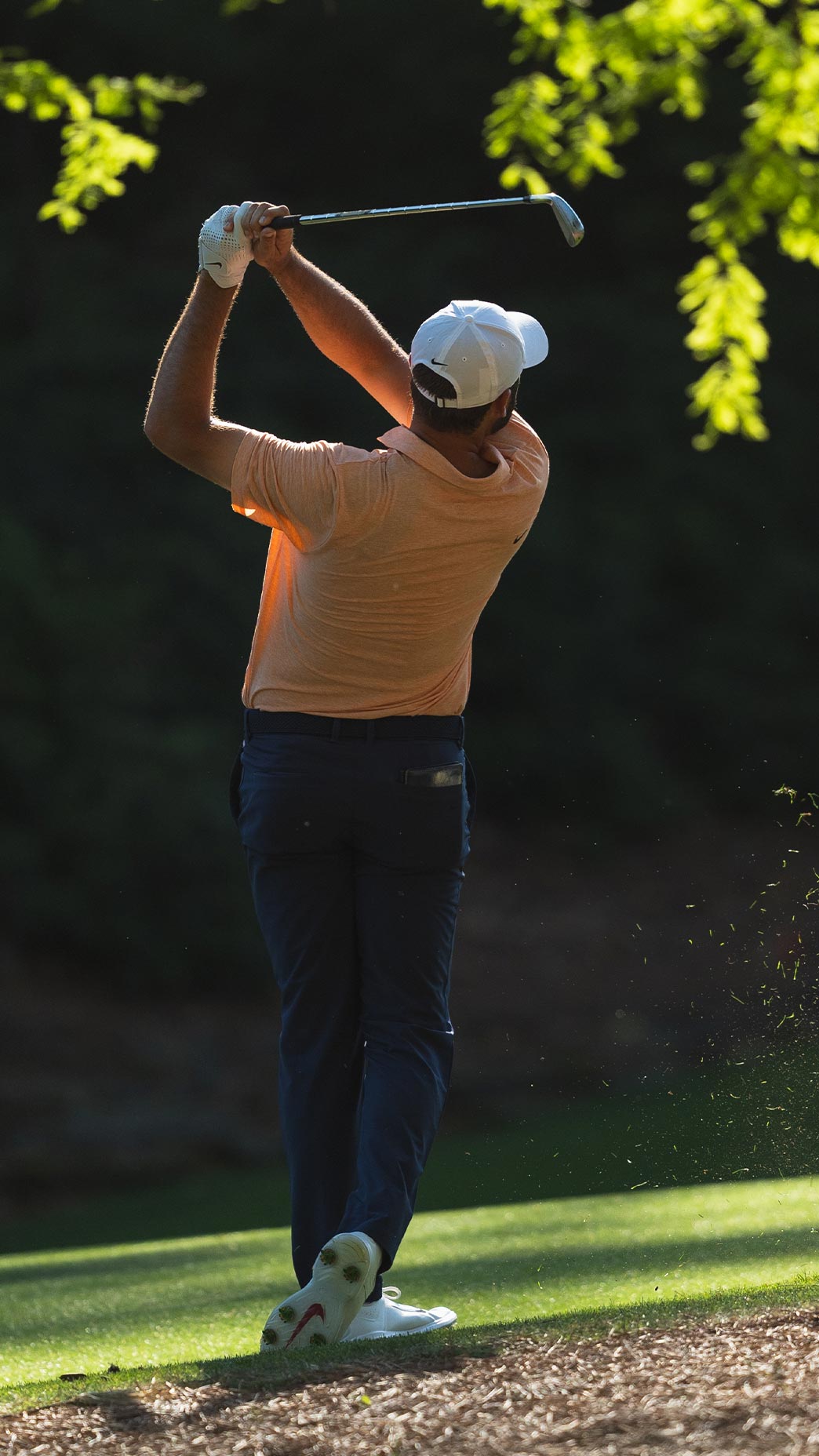
Darren Riehl
SIX MINUTES BEFORE SCOTTIE SCHEFFLER toppled the golf world again, a breeze whistled through the Augusta National clubhouse.
The building had emptied during tournament play, but the energy picked up again quickly in the seconds preceding the biggest moment of the week. Many of the green jackets had hustled back quickly, eager to find a perch on the patio with a vantage point into the colossus surrounding the 18th green. Many more golf movers and shakers hung out in the shadows of the giant oak, angling for one more glad-hand before the sun set on Augusta National.
Inside the clubhouse, a blast of cool air cascaded from the Champions Locker Room and down the stairs. After a few loud steps, a voice broke the quiet.
“Feeling ok?” the voice said.
“Yeah,” another more familiar voice replied somberly.
It was Jon Rahm, the reigning tournament champion, for a short while longer, anyway. He was preparing for his final duty as 2023 Masters champion, which would be to crown the 2024 Masters champion by slipping the green jacket onto the winner’s shoulders. Before Scheffler fully arrived, Rahm was the dominant ball striker of this era. But the pained look on the Spaniard’s face indicated he, too, seemed resigned to the truth: Any opportunity Rahm has to wear the jacket again involves beating the guy walking up the 18th fairway — and right now, there’s not a golfer alive who can do that.
Rahm exited through the clubhouse’s front door, zipping past a line of security and shaking the hands of the few straggling green jackets. The crowd hardly noticed him. Their attention was forward, to the amphitheater on 18, where the new champion was about to be crowned.
Scheffler dazzled again on the 18th, chipping on and one-putting for his second and most consequential Masters victory. After four-putting on the 72nd in 2022 to his own chagrin, this time around Scheffler didn’t even remove his hat on the walk up the 18th fairway. He had wanted to stay in the moment.
When Tiger poured in his own world-toppling putt in 1997, for the largest margin of victory in tournament history, he was so deep in the zone that he had hardly noticed the moment’s gravity until the ball had dropped into the bottom of the cup. So few of even the greatest golfers know how that feels. On Sunday, Scheffler was one of them.
The emotion escaped quietly from Scheffler as his three-foot par putt disappeared, nowhere near the Woodsian uppercut of ’97. Rather, with the full attention of Augusta National focused on him, he offered triumph of a more genteel Scottie-style — wrapping caddie Ted Scott in a bear hug before a fist pump emerged.
It was a signature moment. A pronouncement. A quiet but very self-assured hello, world.
Back in the clubhouse, a pair of velvet-gloved Augusta National officials emerged from the quiet flanked by a security detail and holding the Masters Trophy.
The older man at the head of the security procession glimpsed at the huddled masses on 18 and stopped himself. This final tradition, the trophy ceremony, is the most delicate piece of the Masters. In a week in which all the little things signify big things, the dinner-plate-sized, 900-piece-silver trophy is perhaps the most significant.
The man looked at the trophy, at both pairs of velvet gloves, and at the golf course. He paused for a long beat, absorbing the energy and history hanging in the air. Then he said three words that felt apt after yet another virtuoso Scheffler performance.
“Are you ready?”


